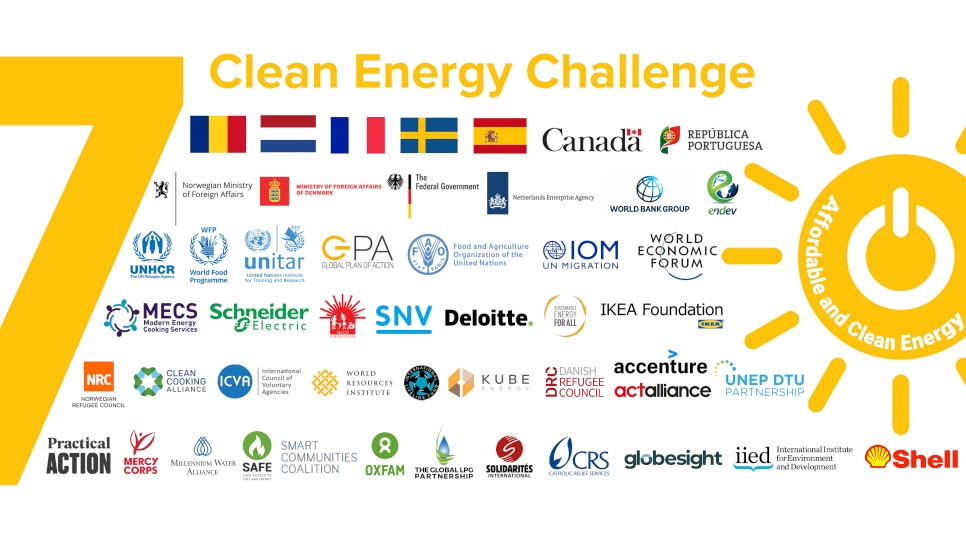Clean Energy Challenge
People who flee conflict often find refuge in densely populated and ecologically fragile environments that already experience the adverse effects of climate change. The influx of refugees and internally displaced persons can also exacerbate these effects, for example when they chop down trees for firewood daily. Having access to sustainable, clean energy is closely linked to refugees’ safety and security and is key to ensuring their basic needs are met. It can also help create more inclusive communities that are more resilient to climate change.
We all have a responsibility to act, both by reducing our own emissions and by ensuring that refugees and the communities hosting them have clean and renewable energy.
What is the Clean Energy Challenge?
The Challenge is an effort by individuals, businesses and organizations from all over the world to bring systemic change to displacement settings by replacing unsustainable energy with clean, modern energy sources that can be used for households, community services and humanitarian operations.
We have committed to achieving the ambitious goal of bringing affordable, reliable, and sustainable energy to all settlements of forcibly displaced people and nearby host communities by 2030.
To achieve this goal, we are targeting four key areas for development. They are:

We need your help
Achieving the Challenge goal will require creating a new market for clean energy that has not existed before and will need coordinated action from all sectors of society. Each partner will need to play their part to make this a reality:
- Individuals everywhere can support the Clean Energy Challenge through donations. Your help is critical to successfully deliver on this goal.
Donate now - Businesses can find ways to bring affordable solar, wind, biomass, and other forms of clean energy to refugees.
Empowered with a choice as consumers, refugees and displaced people can meet their families’ energy needs, maintain their dignity and become more resilient. - Civil society organizations can ensure the communities they support are included in the design of local clean energy solutions.
- Energy experts can collect local data on the energy needs of displaced populations and design bottom-up energy projects.
- States can integrate refugees into their energy and development policies, planning and programmes.
Join the Action Group
The Clean Energy Challenge Action Group is a multi-stakeholder forum of over 200 donors, private sector partners, government officials, business networks, research institutes and UN agencies, and is open to all.
Together, we work towards realizing the four key energy outcome areas through joint approaches, focusing on boosting self-reliance of displaced populations in line with the Global Compact for Refugees.
Steering the effort are Jaime de Bourbon de Parme, UNHCR Senior Advisor on Private Sector Partnerships, and Thomas Fohgrub, Team Leader of the coordination unit in the UN's inter-agency Global Plan of Action for Sustainable Energy in Displacement Settings.
Learn more about how you can contribute to the Challenge and what has been achieved so far in this June 2020 update (external link).
To join the Clean Energy Challenge, please contact the secretariat:
Aimee Jenks ([email protected])
Desk Officer, GPA Sustainable Energy Solutions
Christina Gkouvali ([email protected])
UNHCR Associate Liaison Officer
Further resources
- Learn more about the Challenge's guiding principles and how it links with national plans and existing initiatives
- Find out more about the Global Refugee Forum
- Global Plan of Action - Website (external link)
- Read more about UNHCR's partnership with UNEP DTU, the UN Environment Program and Technical University of Denmark Partnership, co-chair of the Research and Evidence Working Group of the Global Plan for Action (external link)
- Energy and Environment - Technical guidance for humanitarian COVID-19 response (Version 1, April 2020) (external link)
- Sustainable Development Goal 7 (energy) and COVID-19 situations of displacement: A briefing note (external link)
- Clean Energy Challenge LinkedIn Group (external link)
- More on energy access in displacement: Global Plan for Action webinar series (external link)
- Learn more about setting up the global structures and processes for implementation (external link)
- Check out this story map on "Clean Energy for refugees and host communities in Tanzania"

